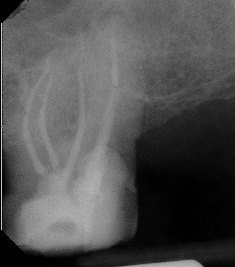
by Dr. Jacqueline S. Allen | Aug 4, 2014 | Blog, Endodontics, Endodontist, Root Canal
 Avoidance is a problem that often leads patients to postpone visiting their Phoenix Endodontist. Many have waited too long for their root canal, and are now in major pain. Dr. Jacqueline S. Allen of Phoenix Endodontic Group explains why you should never wait to have a root canal done.
Avoidance is a problem that often leads patients to postpone visiting their Phoenix Endodontist. Many have waited too long for their root canal, and are now in major pain. Dr. Jacqueline S. Allen of Phoenix Endodontic Group explains why you should never wait to have a root canal done.
When your dentist has told you that you need a root canal, you may have many emotions and may not take action immediately. Dr. Allen observes a few common reasons people put off their root canal: The three biggest fears of dental treatment are #1- Time (this will take too long), #2 – Pain (I hate going to the dentist, it always makes me hurt), and #3 – Money (patients don’t want to spend their hard earned money on an emergency dental procedure). While all of these reactions are reasonable, delaying the procedure will make things worse.
Your Phoenix Endodontist frequently has a bigger job ahead if you’ve waited to have a root canal. More extensive work may be required, or you may lose the chance to save the tooth altogether. The biggest risk is that a patient can develop an infection that becomes difficult to control. Additionally, waiting too long puts the patient at risk for having to have the tooth extracted. Waiting too long could cause the tooth to be condemned. A tooth with a damaged nerve or deep infection will not get better on its own.
Having a root canal done immediately after being told you need one provides several advantages. When the problem is caught early, it may be resolved more quickly and successfully. You’ll suffer less pain since you’ve dealt with it quickly. You are less likely to need the tooth pulled, which would result in the added expense of bone grafts and tooth implants down the road. You’ll prevent other medical issues that can occur as a result of the infection present in the tooth.
If you are told that you need a root canal, act quickly. Call Dr. Allen, your Phoenix Endodontist, to bring your smile back to life!

by Dr. Jacqueline S. Allen | Jul 7, 2014 | Blog, Endodontics, Endodontist
Patients go to Phoenix Endodontist Dr. Jacqueline S. Allen for dental situations requiring expert or specialized care. One advanced procedure performed by Dr. Allen is called an Apicoectomy, which is a microsurgery performed when the root of the tooth is endangered.
 To understand an apicoectomy, knowing about the structure of a tooth is helpful. Your tooth is made of a hard outer coating surrounding a soft pulp. Within this pulp are the tooth’s blood vessels and nerves, which extend through the root of your tooth. The tooth’s root(s) come to a point called the apex. When this point is compromised by infection, it becomes necessary to remove it is an apicoectomy.
To understand an apicoectomy, knowing about the structure of a tooth is helpful. Your tooth is made of a hard outer coating surrounding a soft pulp. Within this pulp are the tooth’s blood vessels and nerves, which extend through the root of your tooth. The tooth’s root(s) come to a point called the apex. When this point is compromised by infection, it becomes necessary to remove it is an apicoectomy.
Often, a previous root canal therapy that became infected or did not completely remove existing infection can be the cause of a problematic apex. Non-healing previously treated teeth are most likely to need apicoectomy. Sometimes the tooth has a large post that is hard to remove or the restorative on the coronal aspect of the tooth is compromised too much if trying to drill through it. Anatomical considerations can be a factor as well, Dr. Allen states.
During the apicoectomy, Dr. Allen will make a miniscule incision in your gum near the troublesome tooth. Through this access point, she enters the root structure of the tooth. With the help of a microscope and special tools, Dr. Allen removes the infected apex and ensures any infection in the surrounding area is thoroughly cleaned away. Once this process is complete, Dr. Allen cleans and seals the end of the tooth canal.
While you are recovering from your apicoectomy, you’ll want to heed a few details. Take care not to brush in the area until sutures are removed, Dr. Allen advises. “Use an ice pack to reduce any swelling that may occur and no heavy activity or exercise.”
If you need root canal therapy, it’s best to go to an endodontic expert like Dr. Allen to ensure the best outcome and minimize your risk for a future apicoectomy. If you are already facing this procedure, call Dr. Allen at Phoenix Endodontic Group immediately for the best outcome!

by Dr. Jacqueline S. Allen | Jun 9, 2014 | Blog, Endodontics, Endodontist, Featured, Root Canal
 Chances are that most adults know of root canal treatment, but may not know what it involves. Root canal therapy is an extremely effective way to repair cracked or decaying teeth and prevent tooth loss. Dr. Jacqueline S. Allen of Phoenix Endodontic Group explains how this procedure can help you restore a bad tooth and why you shouldn’t be fearful of a root canal.
Chances are that most adults know of root canal treatment, but may not know what it involves. Root canal therapy is an extremely effective way to repair cracked or decaying teeth and prevent tooth loss. Dr. Jacqueline S. Allen of Phoenix Endodontic Group explains how this procedure can help you restore a bad tooth and why you shouldn’t be fearful of a root canal.
Gone are the days when root canal treatment was a major ordeal that left a patient in pain. With today’s methods and technology, many patients report minimal discomfort and compare it to having a filling done.
During the procedure, the infected pulp of the tooth is removed, the inside cleaned thoroughly, and the tooth refilled. This process restores the structure of the tooth. Any discomfort from the repair is mild and can be easily managed by using over the counter pain medication. As well, the materials used in the procedure have changed over the years. At one point in time, the material used to fill the roots was silver. Now it is gutta percha with antibacterial sealer, says Dr. Allen.
With time and experience, Endodontists have developed best practices to minimize complications, especially for patients who have severe symptoms or an unusual anatomy. We now use a rubber dam screen for all root canal procedures. This is to isolate the tooth so no bacteria from saliva can get in the tooth, as well as keep all instruments and disinfectants from falling into the mouth and possibly down the throat, Dr. Allen mentions.
Additionally, microscopes with optimal lighting are used to clean out the tooth roots more thoroughly, she states. All of these accumulated improvements equate to a better outcome, less risk of complications, improved comfort, and a great likelihood that your root canal treatment will be successful.
Once you’ve noticed a problem, it’s important to get treatment right away. Once the tooth has irreversible pulpitis or necrosis, the problem will not go away on its own, Dr. Allen says. Acting quickly improves your odds of a successful repair. For additional questions on root canal treatment or to schedule your appointment, contact Phoenix Endodontic Group today!

by Dr. Jacqueline S. Allen | May 23, 2014 | Blog, Endodontist
In 2012 and 2013, the Central Arizona Dental Society Foundation has hosted its Dental Mission of Mercy (AZMOM) event at the Arizona State Fairgrounds in Phoenix, AZ. Due to the overwhelming success of these events, we are proud to announce our 2014 CADS AZMOM Event. On December 12th – 13th 2014 we will once again be conducting our clinic @ the State Fairgrounds.

We utilize 100 portable dental units and require over 1,500 volunteers to make this event occur. Our first two events changed the lives of so many people. 300 dentists, along with at least as many dental assistants and hundreds of dental hygienists along with about 600 lay Volunteers. Dental supply companies contributed supplies and materials which assisted us in treating 2,020 patients and provided $1.5 million in free dental care over the two day period. These events were the largest charitable dental clinics ever held in the State of Arizona.
The emphasis will again be on basic dental care such as fillings, extractions and cleanings. Limited lab work (i.e., stainless-steel crowns for children, treatment partials) will be offered. The program is unable to treat patients with specific medically-compromising conditions (e.g., extremely high blood pressure, severe disabilities).
Our CADS AZMOM event focuses on:
- Providing free access to dental care while placing a high priority on patients suffering from dental infections or pain;
- Raising public awareness of the increasing difficulty low-income adults and children face in accessing critical dental care; and
- Creating health care advocates via the hundreds of lay volunteers participating in the event
Arizona residents suffer from higher rates of dental disease and benefit less from proven preventative methods than other states. A recent survey revealed that 21% of Arizona adults and 31% of Arizona children have never had a dental check-up.
The good news is that most oral diseases are preventable. In Arizona, 5% of children ages 6 months through 2 years have had tooth decay. By the time children reach 11 to 13 years, over 65% have experienced tooth decay, and by the time adults reach age 45, more than 99% have had decay.
Additionally, Arizonans report one of their major barriers to receiving dental services relates to finances. While 24% of Arizonans lack medical insurance, over 44% of adults and 38% of children lack dental insurance.
In summary, more Arizonans have dental disease than found nationally, while many report difficulty accessing dental services. Efforts such as AZMOM, which has treated over 3,500 individuals (two years), are needed to improve the oral health for children and adults in this state.
To learn more about this important event or to volunteer, log onto http://www.azmom.org, https://www.facebook.com/cadsazmom or https://twitter.com/CADSAZMOM.
» Learn more about Arizona Dental Mission of Mercy and the Event

by Dr. Jacqueline S. Allen | May 19, 2014 | Blog, Endodontics, Endodontist, Featured
Dental emergencies can happen in a split second, and can quickly result in lost teeth. Cracked teeth should send you running for a dental professional immediately since a crack can allow dangerous bacteria to invade, causing sensitivity, decay and tooth loss. How can you avoid cracking or fracturing your teeth? It’s simpler than you might think, according to Dr. Jacqueline S. Allen of Phoenix Endodontic Group.
Protect Yourself
“Most cracked or broken teeth are the result of dental trauma, either recently or in the past and no treatment was done at that time,” Dr. Allen says. This includes damage from sports injuries, falls or accidents, or chewing on hard objects or foods. Athletes should ALWAYS use a mouthguard and see the dentist or Endodontist for any dental emergencies that may occur. Never chew on ice or hard objects, and avoid using your teeth to open packages. Falls and accidents are a bit more difficult to prevent, but if you are able to protect your face and mouth when falling, make the attempt to do so.
 Routine Checkups
Routine Checkups
Dr. Allen explains, Dental restorations (fillings) that are 10 years or older should be looked at during a patient’s routine dental care. Fillings can break and chip and thereby expose the remaining tooth structure to potentially further break down. Age and location of prior dental work can play a role in damaged teeth which can lead to a dental emergency. To add to that, a routine dental checkup can identify small cracks that can be easily fixed, preventing them from developing into big problems down the road.
Keep Teeth Strong
The enamel of your teeth is a very hard substance, but one that can be eroded or damaged due to bad habits like soda drinking, eating sugary foods, brushing too hard, and chewing fingernails or ice. Brush with toothpaste that contains fluoride, floss regularly, and talk to your doctor about your calcium and vitamin D intake.
Many dental emergencies can be avoided by using caution and common sense. If you have cracked or fractured teeth already, Dr. Allen is here to help!

by Dr. Jacqueline S. Allen | Apr 28, 2014 | Blog, Endodontics, Endodontist, Featured, General Information
 You probably already know that a twice-yearly dentist visit is a must for a healthy mouth. Why should you consider adding a Phoenix endodontist to your dental care program?
You probably already know that a twice-yearly dentist visit is a must for a healthy mouth. Why should you consider adding a Phoenix endodontist to your dental care program?
“The most common reason a patient needs to see an endodontist is that the patient is in pain or has an abscessed tooth. When a tooth becomes “necrotic” that means that the nerves and tissue inside the tooth are dying. Some people have pain, others do not. When the nerve has died and the patient does not feel it, the tooth may become more susceptible to fracture if left untreated,” says Dr. Jacqueline S. Allen, D.D.S., M.S. of Phoenix Endodontic Group.
An endodontist has advanced tools and equipment to diagnose and treat complex dental cases, plus specialized training. Fractured or chipped teeth, tooth decay, tooth pain, and trauma to the teeth are all examples of issues for which a Phoenix endodontist should be involved. “We treat many patients with complicated cases, and spend as much time and have as many visits as it takes to resolve a patient’s endodontic issue,” Dr. Allen adds.
Not all endodontists are the same, even if they provide the same menu of services. Dr. Allen states that “Phoenix Endodontic Group is a small family business. We strive to treat all patients the way we wish to be treated by our healthcare professionals. Attention to detail and prompt efficient service to patients has led us to develop many lasting relationships with our referring doctors.”
If you are trying to find the RIGHT endodontist, an important detail is the practice’s business approach. Those under insurance contracts may be limited in the services they provide and be encouraged to spend as little time as possible with each patient. “At Phoenix Endodontics, we take a limited amount of insurance contracts, because we feel that in endodontics patient treatment and care can be compromised if insurance companies are dictating what an endodontist can be reimbursed for a procedure,” remarks Dr. Allen.
“Personal attention and top quality care is what a patient will always get from Phoenix Endodontic Group,” Dr. Allen promises. Contact us today to schedule your appointment!

 Avoidance is a problem that often leads patients to postpone visiting their Phoenix Endodontist. Many have waited too long for their root canal, and are now in major pain. Dr. Jacqueline S. Allen of Phoenix Endodontic Group explains why you should never wait to have a root canal done.
Avoidance is a problem that often leads patients to postpone visiting their Phoenix Endodontist. Many have waited too long for their root canal, and are now in major pain. Dr. Jacqueline S. Allen of Phoenix Endodontic Group explains why you should never wait to have a root canal done.



 Chances are that most adults know of root canal treatment, but may not know what it involves. Root canal therapy is an extremely effective way to repair cracked or decaying teeth and prevent tooth loss. Dr. Jacqueline S. Allen of
Chances are that most adults know of root canal treatment, but may not know what it involves. Root canal therapy is an extremely effective way to repair cracked or decaying teeth and prevent tooth loss. Dr. Jacqueline S. Allen of 


 Routine Checkups
Routine Checkups
 You probably already know that a twice-yearly dentist visit is a must for a healthy mouth. Why should you consider adding a Phoenix endodontist to your dental care program?
You probably already know that a twice-yearly dentist visit is a must for a healthy mouth. Why should you consider adding a Phoenix endodontist to your dental care program?